

Building peace in the minds of men and women. BRICS - Wikipedia. BRICS is the acronym for an association of five major emerging national economies: Brazil, Russia, India, China and South Africa.
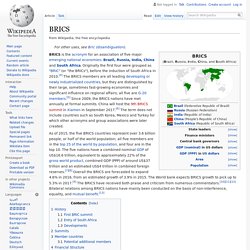
Originally the first four were grouped as "BRIC" (or "the BRICs"), before the induction of South Africa in 2010.[4] The BRICS members are all leading developing or newly industrialized countries, but they are distinguished by their large, sometimes fast-growing economies and significant influence on regional affairs; all five are G-20 members.[5] Since 2009, the BRICS nations have met annually at formal summits. China will host the 9th BRICS summit in Xiamen in September 2017.[6] The term does not include countries such as South Korea, Mexico and Turkey for which other acronyms and group associations were later created. History[edit] First BRIC summit[edit]
Council on Foreign Relations. The Council on Foreign Relations (CFR) is an American nonprofit, nonpartisan membership organization, publisher, and think tank specializing in U.S. foreign policy and international affairs.
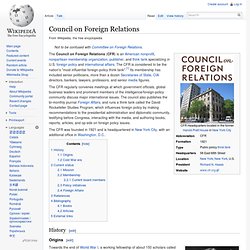
The CFR is considered to be the nation's "most influential foreign-policy think tank".[1] Its membership has included senior politicians, more than a dozen Secretaries of State, CIA directors, bankers, lawyers, professors, and senior media figures. The CFR regularly convenes meetings at which government officials, global business leaders and prominent members of the intelligence/foreign-policy community discuss major international issues. Cross-Border Inter-Bank Payments System - Wikipedia. The Cross-Border Interbank Payment System (CIPS) is a payment system which, offers clearing and settlement services for its participants’ in cross-border RMB payments and trade.
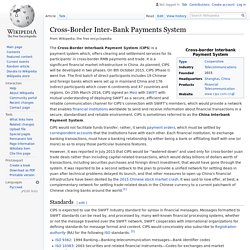
It is a significant financial market infrastructure in China. As planned, CIPS will be developed in two phases. Military Strength Comparison. Simply select a country from the two available dropdown lists below to begin your comparison of national firepowers.
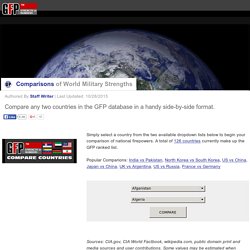
A total of 126 countries currently make up the GFP ranked list. Popular Comparions: India vs Pakistan, North Korea vs South Korea, US vs China, Japan vs China, UK vs Argentina, US vs Russia, France vs Germany Sources: CIA.gov, CIA World Factbook, wikipedia.com, public domain print and media sources and user contributions. Global Firepower Military Ranks - 2016. The finalized ranking relies on over 50 factors to determine a given nation's Power Index ("PwrIndx") score.
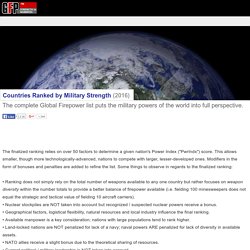
This allows smaller, though more technologically-advanced, nations to compete with larger, lesser-developed ones. Modifiers in the form of bonuses and penalties are added to refine the list. Some things to observe in regards to the finalized ranking: List of modern great powers - Wikipedia. In a modern context, recognized great powers came about first in Europe during the post-Napoleonic era.[1] The formalization of the division between small powers[2] and great powers came about with the signing of the Treaty of Chaumont in 1814.
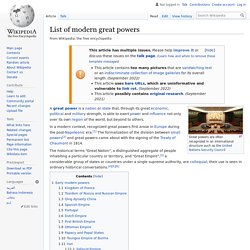
The historical terms "Great Nation",[3][4][5] a distinguished aggregate of people inhabiting a particular country or territory, and "Great Empire",[6] a considerable group of states or countries under a single supreme authority, are colloquial; their use is seen in ordinary historical conversations (historical jargon). Early modern powers[edit] Early Modern history France[edit] 1450s–1815 France was a dominant empire possessing many colonies in various locations around the world.
Early French victories exported many ideological features of the French Revolution throughout Europe. Historians have estimated the death toll from the Napoleonic Wars to be 6.5 million people, or 15% of the French Empire's subjects. Modern Venetian Republic[edit] Great power - Wikipedia. A great power is a sovereign state that is recognized as having the ability and expertise to exert its influence on a global scale.
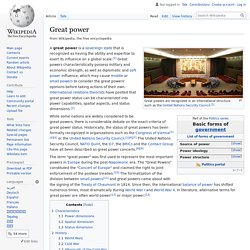
Great powers characteristically possess military and economic strength, as well as diplomatic and soft power influence, which may cause middle or small powers to consider the great powers' opinions before taking actions of their own. International relations theorists have posited that great power status can be characterized into power capabilities, spatial aspects, and status dimensions. While some nations are widely considered to be great powers, there is no definitive list of them. The term "great power" was first used to represent the most important powers in Europe during the post-Napoleonic era. Characteristics[edit] There are no set or defined characteristics of a great power. The World's Billionaires - Wikipedia. The net worth of the world's billionaires increased from less than $1 trillion in 2000 to over $7 trillion in 2015.
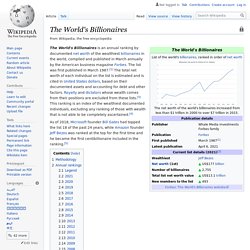
Richest billionaires - Forbes 2016 World's Billionaires List Top 10 - Pictures. G20 - Wikipedia. The G20 (or Group of Twenty) is an international forum for the governments and central bank governors from 19 countries and the European Union.
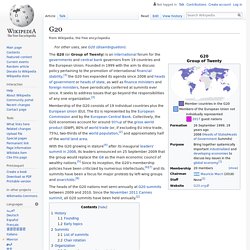
Founded in 1999 with the aim to discuss policy pertaining to the promotion of international financial stability,[3] the G20 has expanded its agenda since 2008 and heads of government or heads of state, as well as finance ministers and foreign ministers, have periodically conferred at summits ever since. It seeks to address issues that go beyond the responsibilities of any one organization.[3] International Labour Organization. Council on Foreign Relations.
Foreign Affairs. INTERNATIONAL FORUM ON GLOBALIZATION. IM. INTERNATIONAL FORUM ON GLOBALIZATION. Globalization - Wikipedia. Globalization or globalisation is the process of interaction and integration among people, companies, and governments worldwide.
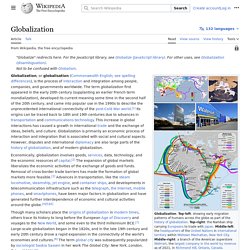
As a complex and multifaceted phenomenon, globalization is considered by some as a form of capitalist expansion which entails the integration of local and national economies into a global, unregulated market economy.[1] Globalization has grown due to advances in transportation and communication technology. EUROPA - European Union website, the official EU website. Welcome to the United Nations.